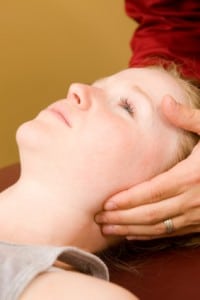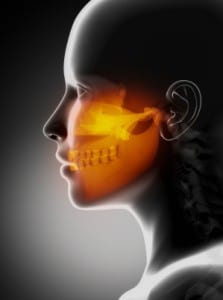Years ago, my dentist asked if I grind my teeth. I told her I didn’t think so, and she begged to differ. Whether I was doing it currently or not, she said, at some point I had clenched my jaw enough to wear my teeth down unevenly. I suspect this was during my teenage years (what?? stressed as a teenager? unheard of!), but most of us do this at some point — hold enough tension in our jaws to actually create pain or structural changes.
The results of tooth grinding (bruxism is the official term — what a great word!) range from jaw tension and pain on  waking, to headaches and neck pain, to severe pain and problems with the functioning of the jaw. People with TMJ disorder (TMJ stands for the temperomandibular joint, aka the jaw) experience pain, popping, clicking, or sticking of the jaw with movement, and sometimes an inability to open the mouth.
waking, to headaches and neck pain, to severe pain and problems with the functioning of the jaw. People with TMJ disorder (TMJ stands for the temperomandibular joint, aka the jaw) experience pain, popping, clicking, or sticking of the jaw with movement, and sometimes an inability to open the mouth.
Standard treatment for all these situations usually involves wearing a mouth guard at night. This protects the teeth, and can help with jaw tension and pain, but doesn’t address the underlying problem. Painkillers and muscle relaxants are also used. In severe cases, surgery may be performed to correct structural problems in the jaw.
Acupuncture has been shown to be very effective in treating TMJ. And, unlike symptomatic treatments, results can be very long-lasting (see below for details on the research).
How It Works
Acupuncture takes three different strategies in working with TMJ and other types of jaw tension and pain.
Local/Structural treatment:
This is a very direct approach, aimed at the tension, inflammation, and misalignment in the joint itself. Local points can relieve muscle spasm and decrease pain and swelling. This allows the jaw to move more freely and to align itself naturally so that the joint works more smoothly.
In some cases, when alignment is very compromised, working with a chiropractor can help move the jaw into a better working position, while the acupuncture will help keep the area relaxed and maintain better alignment.
Channel treatment:
Acupuncture is based on the premise that most health problems are caused by blockages in the channels (also called meridians) of energy flow in the body. Points may be chosen to open up these meridians as a whole, so that energy flows more smoothly through the jaw area.
Addressing stress and tension:
It’s totally natural to clench your jaw when stressed, frustrated, or angry. We’re especially susceptible to doing this at night, when we have no control — or even awareness –over what we’re feeling or how we’re expressing it in the body.
Acupuncture excels at relaxing the body, releasing tension, and retraining the body’s habits of where it tends to stash tension when it arises.
Self-care for jaw pain
First, if it’s bad, get treatment! You don’t want to live in pain, and it’s hard to reverse a bad case of TMJ on your own.
It’s a good idea to check with your dentist. He or she might find a structural problem that is contributing to your pain.
In the short term, eating softer foods and chewing carefully can really help. There are some good online resources with suggestions for changing your eating habits to be gentle on the jaw.
The single best thing you can do for yourself is to really deal with your stress level. It’s not the only factor in TMJ, but it’s a big contributor to jaw pain. It’s worth it to find ways to handle stress and release tension, and resolve problems that are really bothering you. This will help your treatments work better, and your improvements will last longer. And, of course, being less tense is a good thing, anyway!
The Research
 Acupuncture has been shown in several well-designed studies to be a very effective and safe treatment for TMJ.
Acupuncture has been shown in several well-designed studies to be a very effective and safe treatment for TMJ.
In a 2007 study, TMJ-related short-term muscle pain was significantly improved in people receiving acupuncture.
Shen YF, Goddard G. The short-term effects of acupuncture on myofascial pain patients after clenching. Pain Pract. 2007 Sep. Vol. 7(3):256-64.
A recent British study of 70 cases of dental patients receiving acupuncture for TMJ indicated that 85% of patients benefited with an average reduction in pain intensity of 75%.
Rosted P, Bundgaard M, Pedersen AM. The use of acupuncture in the treatment of temporomandibular dysfunction–an audit. Acupunct Med. 2006 Mar. Vol. 24(1):16-22.
A 2008 study reported high long-term patient satisfaction and improvement of symptoms 18 to 20 years following acupuncture and/or interocclusal appliance (bite plate or splint) therapy.
Bergström I, List T, Magnusson T. A follow-up study of subjective symptoms of temporomandibular disorders in patients who received acupuncture and/or interocclusal appliance therapy 18-20 years earlier. Acta Odontol Scand. 2008 Apr. Vol. 66(2):88-92.
